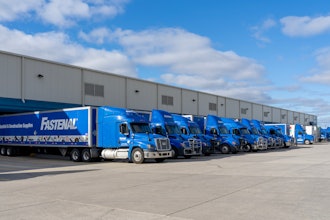It’s no secret that the distribution industry is changing. Technology is rapidly transforming a marketplace that used to rely on word of mouth into one that Tweets. One thing remains the same, however: there is a need for competent sales representatives to grow and represent your brand. As Jack Keough wrote in our March/April issue, “the role of the outside salesperson has never been more important.” While this remains true, the sales role has changed. We analyze that change in this three-part special segment all about the modern sales organization. To read part one, click here.
The world has established that industrial distributors need an online ecommerce presence. No matter what major news outlet you watch, what industry blog you read, or what newspaper you subscribe to, everyone is buzzing about its importance.
So what if you have taken that step and created an ecommerce platform for your business, but your salespeople are pushing back against it? What do you do then?
“When done correctly, ecommerce and direct sales can be complementary. A direct sales model could in fact be a mobilization strategy for your ecommerce platform,” says Billy Bauer, the marketing director at Royce Leather, a company that sells high-end specialty gifts through distributors and online. “An ecommerce solution can actually allow its sales reps to spend more customer face time and less time focused on order processing and administration.”
The experts have weighed in, and there are three key factors to getting your sales force to accept and promote your ecommerce platform.
Foster Transparency
When salespeople are pushing back against an idea, it is most often because they don’t understand the reasons behind the idea or what it will mean for their jobs and their commission in the future. Including them in the process early on as you develop the platform is key.
“The organization owes it to those sales reps to be transparent in terms of strategy. We need to explain what we see, how we see buyers wanting to buy, and where we are headed with the market and technology,” says Dirk Beveridge, President and CEO of 4th Generation Systems. “We need to effectively gather the troops around the strategy so they can see it as an opportunity, not a threat.”
Educating the sales team on how important it is for an ecommerce platform to be in place is a good first step. Share the data with your sales team on your customers’ buying habits — and the data that tells your sales team that ecommerce will help free up their time to spend on bigger direct sales.
“We work very hard to make sure that our sales team is well educated on everything that we do on the web,” says Steven Abbot, Sales Manager at Earnest Machine, a company that distributes fasteners and boasts an impressive online web platform. “The web store is part of Earnest. It took a while for everyone to understand that it isn’t a separate entity, it is just another avenue for the customer to come to us.”
Get Salespeople To Use It, Too!
The most effective way to get your salespeople to promote ecommerce to your customers is to have them use it first. If a sales rep can’t walk the client through their first order over the phone or while on a site visit, your customer is not going to jump on board.
If you have a decent ecommerce system in place with good search features and impressively populated data fields, it should speed the process for both internal sales and customers alike to find products. Rather than having customers wait on the other end of the line while a salesperson flips through an enormous book filled with product codes and numbers, teach the salesperson to use the ecommerce site to get the product information instantly. They can then teach their clients to do the same, and eventually it will help free up the salesperson’s time and eliminate some of the wasted energy that they put toward order processing and not selling.
“The best salespeople use ecommerce as a virtual assistant who is there to serve the client and take orders any time the rep is not available,” says George Athan, Chief Strategist at MindStorm Strategic Consulting. It is important for the customer to be able to transact on their time. “Sales reps should provide so much value, be the source of so much information, and provide so much support that the customer feels the sales rep is indispensable,” he adds. This is how salespeople can assure themselves that their job will never be taken over by ecommerce.
Earnest Machine has a unique way of rewarding their employees for performance: they are awarded a commission based on the overall performance of the company. Abbot says that since their online store is a convenient way to process orders – and requires less time and money – that driving traffic there benefits everybody in the company. “We intentionally make ourselves available in any way that will help the customer,” says Abbot. Your salespeople should be willing to say the same thing.
Give Them Some Credit
“Some organizations feel that the sales team should not be commissioned for orders that come through the ecommerce system. The thinking there is that the sales team is not directly involved with the sale, and therefore no commission should be paid. Be forewarned: this will quickly and directly impact how the sales team views the ecommerce system,” says Bauer.
If salespeople view a new ecommerce platform as a threat to their commission, they will discourage customers from using it. The shiny new ecommerce tool that you implemented to shave overhead and order processing costs will become another wasteland of the internet, and absolutely useless to your and your customers. Instead, consider paying sales a commission on ecommerce orders from their accounts. It doesn’t have to be the same as if it was a direct sale, but a small commission will encourage them to point customers in the direction of the website.
Notes Bauer: “It’s understood in the industry that the costs of processing orders through an ecommerce channel are lower than orders processed through other methods. Because of this, the gross margin on ecommerce orders is greater than traditional orders. Therefore, a strong case can be made that the sales team should be commissioned on these orders.”
Train your salespeople that their time is worth money. While their commission might be less on an ecommerce order, the order itself is not tying up their time that could be utilized chasing after larger – and more lucrative – direct sales.
“Management can reduce the commission rate to offset the storefront’s cost,” says Steve Hartkopf, Managing Partner at Aligned Marketing, LLC. “This is key: distributors need their sales force promoting their website for it to be successful.”
If paying commission on ecommerce sales still isn’t the route you want to take, make pointing customers to your online portal into a challenge for your sales team. The salesperson who has the most orders from their new and existing accounts completed through ecommerce each month could be given a predetermined lump sum or a gift card instead of a standard commission. Earnest Machine actually rewards their customers for using the portal. Every month they hold a giveway and anyone who has placed an order through their web store is eligible to win. Prizes have included $250 gift cards and Weber grills.
Conclusion
Regardless of how you decided to handle ecommerce commissions for your sales team, the fact remains that ecommerce is not going away — and that most customers really do prefer it.
“There will always be reps that feel any purchase a customer makes without them involved takes away from their livelihood. It is important that everyone understands that the customer’s needs come before their own,” says Athan.























